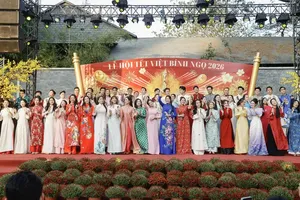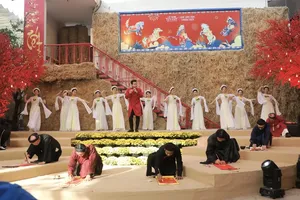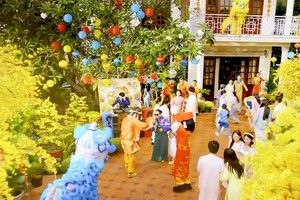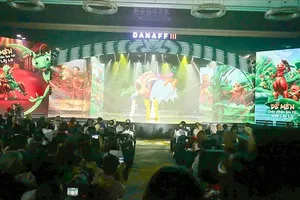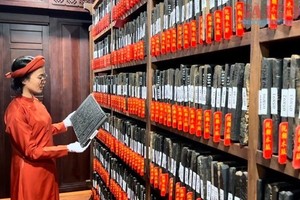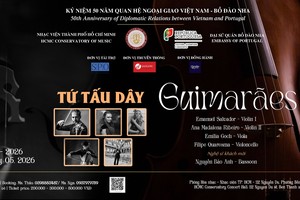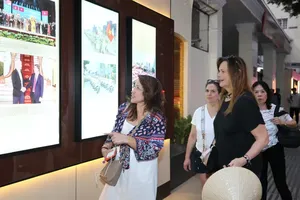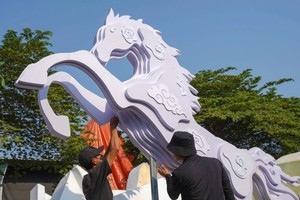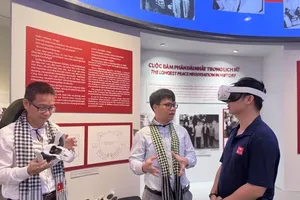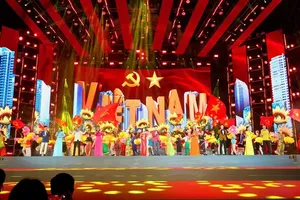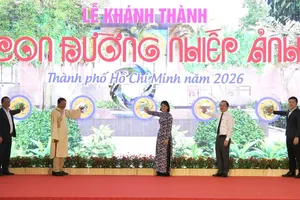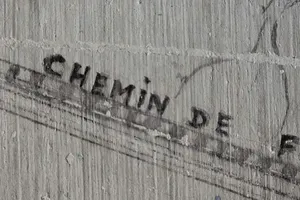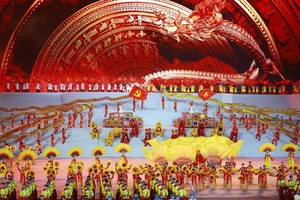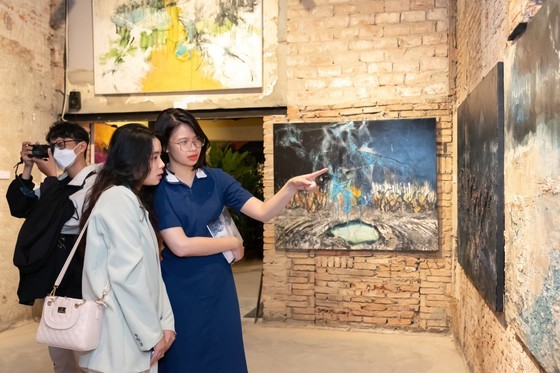 |
The number of visitors to art exhibitions is steadily increasing. |
Multimillion-dollar transactions
Following the "Hon xua ben la" (Timeless Souls: Beyond the Voyage) exhibition in July 2022, which was organized for the first time in Vietnam by Sotheby's, the paintings by the quartet of artists Pho - Thu - Luu - Dam (Le Pho - Mai Trung Thu - Le Thi Luu - Vu Cao Dam) have been increasingly captivating collectors. In 2022 alone, transactions for Le Pho's paintings were recorded at US$26 million while those for Vu Cao Dam's paintings amounted to $7.2 million, with 74 out of 77 lots successfully auctioned. Furthermore, in the first six months of 2023, transactions for Le Pho's paintings totaled $8.7 million, and those for Vu Cao Dam's paintings were at $2.8 million, with 25 out of 39 lots successfully auctioned.
Art collector and art investment advisor Nguyen Duc Tien analyzed, that the pre-auction price estimation trend shows that the average price of Vu Cao Dam's paintings in 2023 is $63,000, marking a $40,000 increase compared to 2022 and a 1.6-fold rise from previous years. This reflects the auction houses' strategy of presenting high-value artworks to offset the decline in quantity. The Hong Kong market (China) continues to be the central hub for auctioning Vu Cao Dam's paintings, with sales exceeding $15 million to date, followed by the French market.
During the "Asian Painters, Major Works" auction held on June 2 at Aguttes auction house in France, out of the 55 artworks showcased, 27 were successfully sold while 28 were sold prior to the auction. As per information from artist Le Pho's family, on July 7 in France, the painting "Jeune Vietnamienne Alanguie", created in 1932 using oil on canvas, will be featured in the auction with an estimated starting price ranging from 150,000 to 200,000 euros. According to local collectors, the buyer will receive a certificate of ownership confirmation presented by Mr. Alain Le Kim, the son of artist Le Pho, and the painting is expected to fetch a price double the estimated value.
A remarkable turnaround in the Vietnamese painting trade on the global stage becomes evident upon examining price information. In 2008, during Sotheby's "Modern and Contemporary Southeast Asian Paintings" auction, the artwork "L'examen Des Lettrés À Hué, Annam" (The Scholar Examination at Hue, Annam) painted in oil on canvas by artist Henry Emile Vollet, a French artist during the Indochina period, was sold for 275,000 Hong Kong dollars, equivalent to VND825 million, an impressive figure at that time. Similarly, Le Pho and Mai Trung Thu's artworks achieved comparable prices in this auction.
After 15 years, there has been a significant transformation in the status of artists and the value of Vietnamese artworks. The silk paintings from the Romanet period by artist Le Pho have been consistently increasing in price, whereas, those that can be considered masterpieces by Henry Emile Vollet are only slightly higher in value. When considering the exchange rate fluctuations in the market over the course of 15 years, there has been a decline in prices, although the figures on the chart may still appear slightly higher.
Staying true to their self-value
There are several aspects that can explain the appeal of Vietnamese paintings, especially those by artists trained at the Indochina College of Fine Arts. This first generation of artists in the country received formal training in painting and learned how to harmoniously blend local and foreign artistic styles, which has gradually increased the value of each artwork over time.
Art researcher Ngo Kim Khoi shared that the strength of the Indochina generation of painters lies in their ability to fully assimilate Western materials and techniques while infusing them with their own creative spirit and Vietnamese identity. As a result, each artwork distinctly reflects the style of Vietnamese artists. If Vietnamese artists were to paint in the style of Japanese or Korean artists, art collectors would seek foreign artists to buy paintings instead of turning to Vietnamese artists.
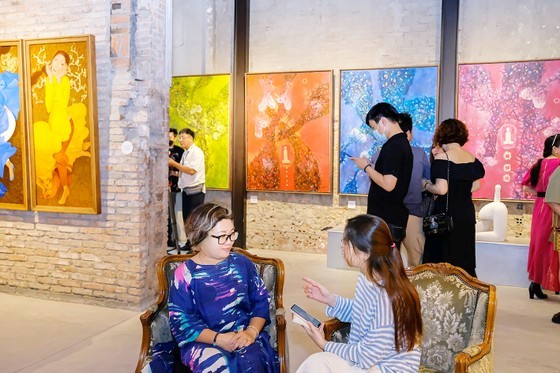 |
The number of visitors to art exhibitions is steadily increasing. |
Providing insights from a market research standpoint, collector Hoang Anh Tuan analyzed that international auctions featuring artworks by the generation of Indochinese painters have got significant value and the momentum of new cash flows, often referred to as "cheap money," resulting from income generated from real estate and financial markets over the past two years. This cash flow has shifted towards art investment as a means of portfolio diversification. These two primary factors have contributed to generating a certain level of excitement in the market.
However, despite being an emerging market, the Vietnamese art market also possesses certain complex characteristics. Market vision is not to simplify the selection of a specific segment, such as themes, artistic genres, or material preferences.
"As an investment channel for diversification, collectors are often drawn to artworks or artists whose values appreciate rapidly over time. Works by renowned artists trained at the Indochina College of Fine Arts, those from the Resistance class, and later contemporary artists who gain recognition, are given attention and prioritized in collecting. This explains why artworks by Resistance class artists, such as Tran Luu Hau or Luu Cong Nhan, sculptor Le Cong Thanh, and Ta Quang Bao, are sought after alongside Indochina artists like Pho - Thu - Luu - Dam or Nghiem - Lien - Sang - Phai. Similarly, artists who established their reputations in the 1990s, like Dang Xuan Hoa or Ha Tri Hieu, have also experienced a remarkable increase in the value of their artworks," shared collector Hoang Anh Tuan.
In light of the impact of the global economic recession, the prices of Vietnamese paintings in the first six months of 2023 have experienced a slowdown, despite the presence of the second-highest priced "Gia dinh trong vuon” (The family in the garden) painting by Le Pho, priced at $2.37 million, following the record-breaking "Chan dung co Phuong” (The portrait of Miss Phuong) painting, priced over $3.1 million. This deceleration in the art market can be attributed to various factors. Nevertheless, this period of stagnation following the high-priced auctions may serve an essential purpose, allowing the prices of Vietnamese art to align more closely with their self-value when viewed from a different perspective.
Collector HOANG ANH TUAN: The Vietnamese art market is experiencing a slowdown.
The art market does not always sync with the fluctuations of the economy. However, the current market demonstrates a deceleration in recent international auctions of Vietnamese paintings. It also indicates no contrary movement and this trend follows a regular pattern. When the cash flow is weak, art collection becomes an unnecessary expense, leading people to be more cautious in their considerations.
The difficult real estate market means that the number of paintings for decorative purposes will decrease, and collectors who see art as a means of investment diversification are still hesitant when it comes to contemporary art. As a result, the majority of contemporary artists will face challenges to make a living this year.
Collector - Art Investment Advisor NGUYEN DUC TIEN: Paintings by renowned artists are almost nonexistent
Paintings by Indochinese artists living abroad are readily available but come at high prices. On the other hand, there is a significant scarcity of artworks by domestic Indochinese artists, as evidenced by the auction held on May 27 by Bonhams in Hong Kong (China), where the quality of artworks by renowned artists was not particularly high. In contrast, paintings by artists from the Resistance class, such as Tran Luu Hau, dominate the market with average artistic quality and are easily accessible for purchase within the country.
In the recent 50th anniversary auction of Sotheby's in Hong Kong, the situation was not much different as paintings by Vietnamese renowned artists were virtually absent. Moreover, high-quality Indochinese paintings were scarce at the auction held on March 31 at Millon Auction in France. The auction featured artworks by contemporary artists such as Phan Cam Thuong and Le Thiet Cuong although they are readily available for purchase within the country.


